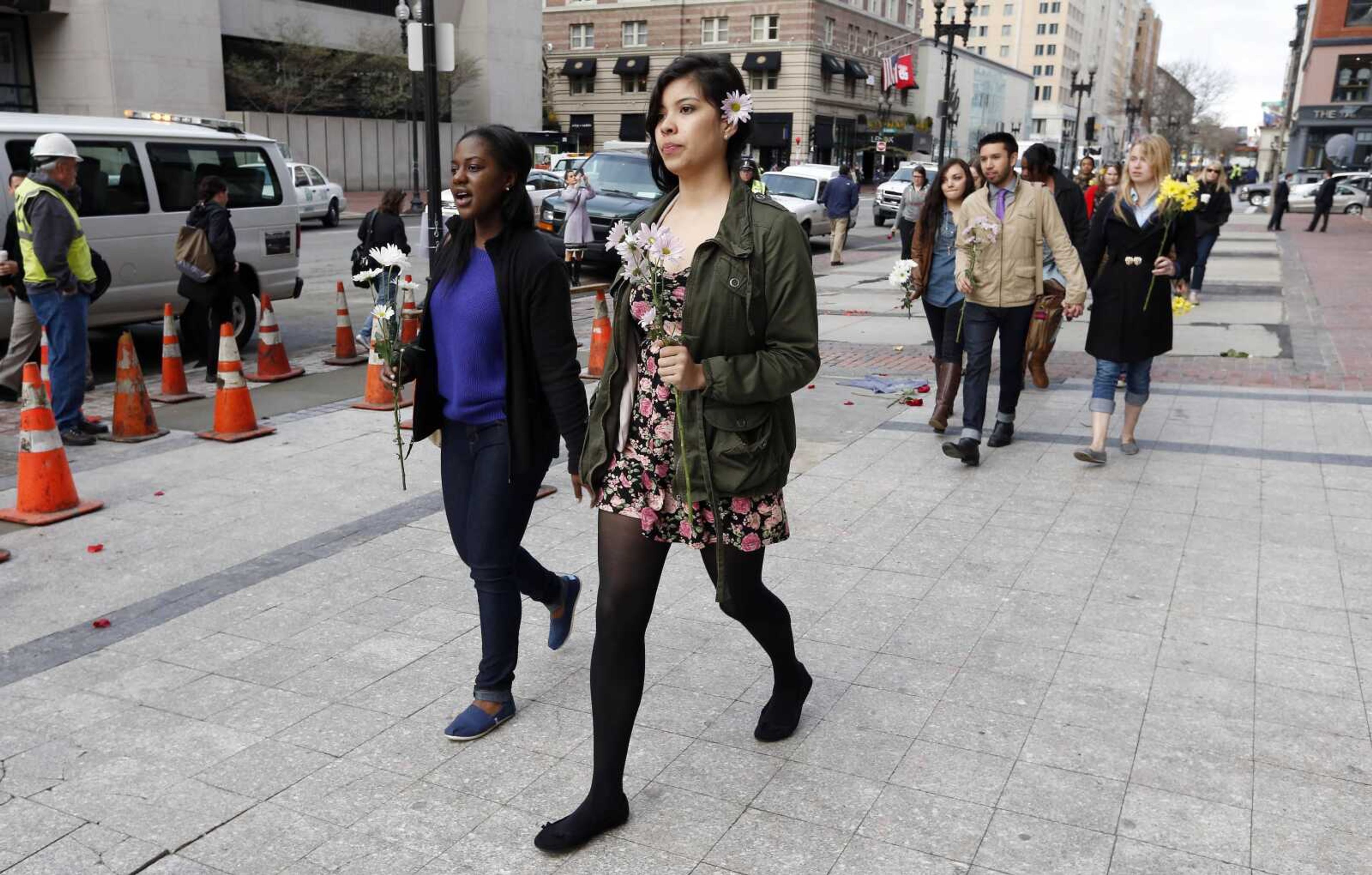Boston area honors slain MIT officer
BOSTON (AP) -- Lawmakers are asking tough questions about how the government tracked suspected Boston Marathon bomber Tamerlan Tsarnaev when he traveled to Russia last year, renewing criticism from after the Sept. 11 attacks that failure to share intelligence may have contributed to last week's deadly assault...
BOSTON (AP) -- As bagpipes wailed, more than 4,000 mourners paid their respects Wednesday to an MIT police officer who authorities say was ambushed in his cruiser by the Boston Marathon bombers, while U.S. investigators trying to get to the bottom of the plot looked for answers from the Tsarnaev brothers' parents in Russia.
In other developments:
-- The bombs were detonated by remote control, according to U.S. officials close to the investigation who spoke on condition of anonymity because they were not authorized to discuss it publicly. It was not clear what the detonation device was, but the charges against surviving suspect Dzhokhar Tsarnaev say he was using a cellphone moments before the blasts.
-- In a sign of how things were slowly and painfully getting back to normal in Boston, the area around the finish line on Boylston Street reopened nine days after the tragedy, freshly poured cement still drying on the repaired sidewalk.
-- On Capitol Hill, lawmakers are asking whether a failure to share intelligence contributed to the bombings April 15 that killed three people and wounded more than 260.
MIT students, faculty and staff, law enforcement officials from across the nation and Vice President Joe Biden gathered on the campus in Cambridge to remember Sean Collier, a MIT officer who authorities say was gunned down by Dzhokhar and Tamerlan Tsarnaev three days after the bombing.
The line of mourners stretched for a half-mile, and they had to make their way through tight security, including metal detectors and bomb-sniffing dogs. Boston native James Taylor sang "The Water is Wide" and led a sing-along of "Shower the People."
Biden called the bombing suspects "two twisted, perverted, cowardly, knockoff jihadis." And he warned that terrorists attack the U.S. to try to force it to "jettison what we value most in the world: our open society, our system of justice that guarantees freedom."
Dzhokhar Tsarnaev, 19, was listed in fair condition as he recovered from wounds suffered in a getaway attempt last week. He could face the death penalty if convicted of plotting with his older brother to set off the shrapnel-packed pressure-cooker bombs that ripped through the crowd at the race. His 26-year-old brother died in a shootout last week.
Many Boylston Street businesses -- banks, restaurants, gyms -- remained closed. But a nearby Starbucks opened for the first time and allowed customers to retrieve purses, cellphones and school bags left behind as they fled in fear.
"I don't think there's going to be a sense of normalcy for a while," said Tom Champoux, who works a few blocks away, as he pointed to the cement and boarded-up windows. "There are scars here that will be with us for a long time."
U.S. investigators traveled to the predominantly Muslim province of Dagestan in southern Russia and were in contact with the brothers' parents, hoping to shed light on the attack.
The parents, Anzor Tsarnaev and Zubeidat Tsarnaeva, plan to fly to the U.S. on Thursday, the father was quoted as telling the Russian state news agency RIA Novosti. The family has said it wants to bring Tamerlan's body back to Russia.
Investigators are looking into whether Tamerlan, who spent six months in Russia's turbulent Caucasus region in 2012, was influenced by the religious extremists who have waged an insurgency against Russian forces in the area for years. The brothers have roots in Dagestan and neighboring Chechnya but had lived in the U.S. for about a decade.
After closed-door briefings on Capitol Hill with the FBI and other law enforcement officials Tuesday, lawmakers said it appeared that the brothers were motivated by a strain of anti-American Islamic extremism, that they were radicalized via the Internet and not by any direct contact with terrorist groups, and that the older brother was the driving force in the bomb plot.
Conflicting stories appeared to emerge about which agencies knew about Tamerlan Tsarnaev's trip to Russia last year.
Homeland Security Secretary Janet Napolitano told a Senate panel that her agency knew about Tsarnaev's journey to his homeland. But Sen. Lindsey Graham, R-S.C., said the FBI "told me they had no knowledge of him leaving or coming back."
Information-sharing failures between agencies prompted an overhaul of the U.S. intelligence system after 9/11.
Sen. Saxby Chambliss, R-Ga., vice chairman of the Senate Intelligence Committee, said it doesn't appear yet that anyone "dropped the ball." But he said he was asking all the federal agencies for more information about who knew what about the suspect.
"There still seem to be serious problems with sharing information, including critical investigative information ... not only among agencies but also within the same agency in one case," said committee member Sen. Susan Collins, R-Maine.
___
Associated Press writers Bridget Murphy and Bob Salsberg in Boston, Lynn Berry in Moscow, and Kimberly Dozier, Adam Goldman, Eric Tucker, Matt Apuzzo, and Eileen Sullivan in Washington contributed to this report.
Connect with the Southeast Missourian Newsroom:
For corrections to this story or other insights for the editor, click here. To submit a letter to the editor, click here. To learn about the Southeast Missourian’s AI Policy, click here.









